Related Research Articles

The First Italo-Ethiopian War, also referred to as the First Italo-Abyssinian War, or simply in Italy as the Abyssinian War, was a war fought between Italy and Ethiopia from 1895 to 1896. It originated from the disputed Treaty of Wuchale, which the Italians claimed turned Ethiopia into an Italian protectorate. Full-scale war broke out in 1895, with Italian troops from Italian Eritrea achieving initial successes against Tigrayan warlords at Coatit, Senafe and Debra Ailà, until they were reinforced by a large Ethiopian army led by Emperor Menelik II. The Italian defeat came about after the Battle of Adwa, where the Ethiopian army dealt the heavily outnumbered Italian soldiers and Eritrean askaris a decisive blow and forced their retreat back into Eritrea. The war concluded with the Treaty of Addis Ababa. Because this was one of the first decisive victories by African forces over a European colonial power, this war became a preeminent symbol of pan-Africanism and secured Ethiopia's sovereignty until the Second Italo-Ethiopian War of 1935–36.

Menelik II, baptised as Sahle Maryam was King of Shewa from 1866 to 1889 and Emperor of Ethiopia from 1889 to his death in 1913. At the height of his internal power and external prestige, the process of territorial expansion and creation of the modern empire-state was completed by 1898.
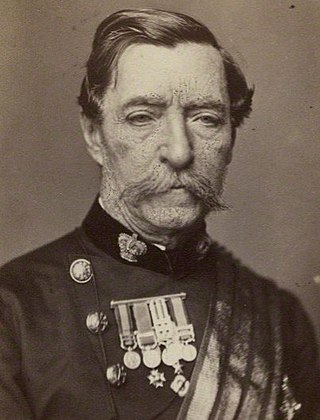
Field Marshal Robert Cornelis Napier, 1st Baron Napier of Magdala was a British Indian Army officer. He fought in the First Anglo-Sikh War and the Second Anglo-Sikh War before seeing action as chief engineer during the second relief of Lucknow in March 1858 during the Indian Rebellion of 1857. He also served in the Second Opium War as commander of the 2nd division of the expeditionary force which took part in the Battle of Taku Forts, the surrender of Peking's Anting Gate and the entry to Peking in 1860. He subsequently led the punitive expedition to Abyssinia in July 1867, defeating the Emperor Tewodros II of Ethiopia with minimal loss of life among his own forces and rescuing the hostages of Tewodros.

Tewodros II was Emperor of Ethiopia from 1855 until his death in 1868. His rule is often placed as the beginning of modern Ethiopia and brought an end to the decentralized Zemene Mesafint.

Yohannes IV was Emperor of Ethiopia from 1871 to his death in 1889 at the Battle of Gallabat, and king of Tigray from 1869 to 1871. During his reign he successfully defended Ethiopia against a large scale Egyptian invasion.

Tsegaye Gabre-Medhin was an Ethiopian poet and novelist. His novels and poems evoke retrospective narratives, fanciful epics, and nationalistic connotations. Gabre-Medhin is considered to be one of the most important Ethiopian novelists, along with Baalu Girma and Haddis Alemayehu. His books have been successful in commercial sales and in even academic theses. His works are solely based in Amharic and English.
Amba Mariam is a village in central Ethiopia. Formerly known as Magdala or Magdalena during the reign of Emperor Tewodros II (1855-1868). Located in the Debub Wollo Zone of the Amhara Region, Amba Mariam has a longitude and latitude of 11°12′N39°17′E.

Zara Yaqob was Emperor of Ethiopia, and a member of the Solomonic dynasty who ruled under the regnal name Kwestantinos I. He is known for the Ge'ez literature that flourished during his reign, the handling of both internal Christian affairs and external wars with Muslims, along with the founding of Debre Birhan as his capital. He reigned for 34 years and 2 months.

The British Expedition to Abyssinia was a rescue mission and punitive expedition carried out in 1868 by the armed forces of the British Empire against the Ethiopian Empire. Emperor Tewodros II of Ethiopia, then often referred to by the anglicized name Theodore, imprisoned several missionaries and two representatives of the British government in an attempt to force the British government to comply with his requests for military assistance. The punitive expedition launched by the British in response required the transportation of a sizeable military force hundreds of kilometres across mountainous terrain lacking any road system. The formidable obstacles to the action were overcome by the commander of the expedition, General Robert Napier, who captured the Ethiopian capital, and rescued all the hostages.
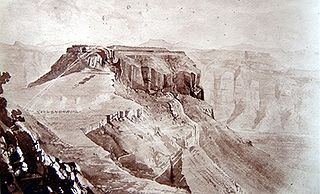
The Battle of Magdala was the conclusion of the British Expedition to Abyssinia fought in April 1868 between British and Abyssinian forces at Magdala, 390 miles (630 km) from the Red Sea coast. The British were led by Robert Napier, while the Abyssinians were led by Emperor Tewodros II.
Tiruwork Wube, also known as Queen Terunesh, was Empress consort of Ethiopia as the second spouse of Emperor Tewodros II of Ethiopia.
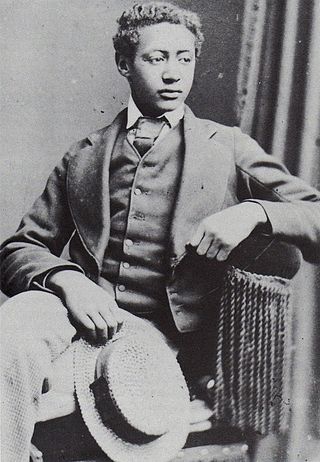
DejazmatchAlemayehu Simyen Tewodoros, was the son of Emperor Tewodros II and Empress Tiruwork Wube of Ethiopia.
Were Ilu is a town in north-central Ethiopia. Located in the Debub Wollo Zone of the Amhara Region, this town has a latitude and longitude of 10°36′N39°26′E. From the 1870s, Were Ilu had a Thursday market.

Abyssinia is a battle honour awarded to units of the British Indian Army and the British Army which participated in the 1868 campaign to free Europeans held hostage in Abyssinia by Emperor Tewodros II. The success of the expedition led to the award of this honour to units of the British Indian Army which had participated in the campaign. The units belonged, with the exception of the Madras Sappers, to the Bengal and Bombay Presidency Armies.

Valerie Susan, Lady Meux, was a Devon-born socialite of the Victorian era. She was the wife of Sir Henry Bruce Meux, 3rd Baronet (1856–1900), who came from one of Britain’s richest brewing dynasties, Meux’s Brewery, founded in 1764, which was a major brewer of porter ale in London in the 19th century.
Workneh Eshete or Azaj Warqnah Ishete, also known as Charles Martin was an Ethiopian physician and politician. He was the first Ethiopian educated as a medical doctor and led the Ethiopian diplomatic mission to the United States in 1927, which negotiated a contract to build a dam on the upper Abay River; and, beginning in 1934, he served as Ethiopia's Minister to the United Kingdom.

The Magdala, also known as The Magdala Tavern or colloquially as simply The Magy, is a pub on South Hill Park in Hampstead, north London. Named after the British victory in the 1868 Battle of Magdala, it was the site of a notorious murder in 1955.
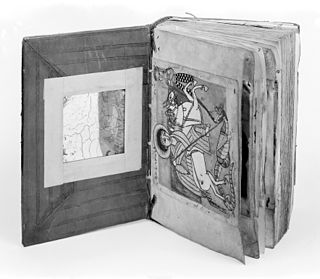
Ethiopian manuscript collections are found in many parts of the world, the monasteries and modern institutions in Ethiopia maintaining extensive collections with some monasteries still centres of manuscript production.
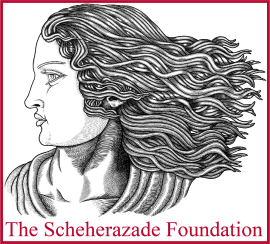
The Scheherazade Foundation CIC is a non-profit community interest company (CIC) established in 2020 to support cultural education and intercultural bridge-building. It is based in London, England.
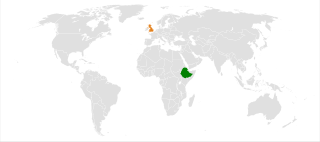
Ethiopia–United Kingdom relations are the bilateral relations between Ethiopia and the United Kingdom. Currently, Ethiopia has an embassy in London and United Kingdom has an embassy in Addis Ababa. Historically, their relations traced over centuries covered a range of areas including, but not limited to, trade, culture, education and development cooperation. The UK is the first country to open its embassy in Addis Ababa. Ethiopia is the first African country to open an embassy in London.
References
- ↑ Pankhurst, Richard. "Maqdala and its loot". Institute of Ethiopian Studies. Archived from the original on December 6, 2008. Retrieved July 8, 2008.
- ↑ Pankhurst, Richard (2006). "Ethiopian Cultural Restitution". Addis Tribune. Archived from the original on April 5, 2007. Retrieved February 4, 2007.